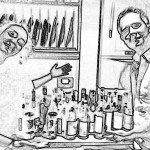I acted in a student film once and afterwards, at the wrap party in a fusty house at the top of town, I rode an office chair down the hill, flying across the junction at the bottom, ramming the pavement on the other side and landing on wet grass.
It had been an act of inevitability: standing in the garden with the rest of the crew, noticing an old chair that just happened to have been abandoned outside the house opposite, wheels proud beneath the streetlights, the steep slope between us, beseeching.
Is it possible to tell a story without some predictability?
Perhaps this is why I love short stories. It’s a small enough form to work and work, filing down the high relief of your set-up. Not that I have achieved this to the extent I would like, yet. Even the novel I am working on repeatedly resists the state of being contrivance free. You can of course choose to leave the scaffolding of your story in place, distinct due to specific artistic accentuation. This is at work in Thomas Hardy’s A Pair of Blue Eyes where the plot rests on an astonishing love triangle, which Hardy plays up in a scene where the new couple, standing on a cliff top, look out through a telescope to an approaching boat, where the previous lover stands on deck with a pair of binoculars. Hardy was an architect before becoming a writer, and these strategic sightlines are plentiful in this early work as he finds a way to shift from moulding buildings to moulding stories.
One reason I am drawn to Alice Munro is that her work is so powerfully real that contrivance loses any synthetic quality, becoming simply the air of the story; necessary, life-giving.
White Dump rests, somewhat, on the relationship a wife enters into, leading to the break-up of her marriage. A relationship with the pilot who takes her husband, their kids, and his grandmother up in a plane. This is also the pilot whose wife makes a vital cake in the story: it is the husband’s birthday the day they go up in the plane.
Told like this, the apparatus of the story may sound artificial, but Munro’s gift of structuring is the antidote. Something else too – the way she pulls focus – is at work here.
There is a moment in the story when the wife and daughter have gone to pick up the cake. They are reversing back out of the catering woman’s driveway and the daughter yells, because she sees the pilot, but the mother isn’t interested, saying, ‘Damn it, Denise, don’t scare me like that! I thought it was one of the kids moving behind the car.’
There had been some children playing earlier in the scene when they had arrived to pick up the cake. The mother asks about them and the catering woman, in turn, looks at Denise, saying, ‘I wish I had a girl this size around to help me.’
Had the children been shown differently, you may have thought: oh, what’s up with these kids, something is going to happen here? Or, there would be a nagging in your mind at the fact that both the pilot and his wife have been engaged, one by one, to play a role in the husband’s birthday, and therefore the story. But nothing in this piece is heavy handed: just delicate seeds planted that earn their right in the first instance so that there is no clunky sense of foreshadowing or structuring. The fact that the catering woman is married to the pilot becomes the least important part of this scene and the narrative as a whole; an immaterial coincidence.
Is this the formula for burying your contrivance; like concealing a noise – make a louder one elsewhere? Though, isn’t it a little coarse to go and bang on the drums just because the doorbell is ringing? Munro shows how to make that second noise work as more than a distraction. Her contrivances are there not to hold up the narrative, but to give it depth.
It is later in the story – a year later – when Denise, at home with her father and brother, opens the door to a woman she does not recognise, but when Denise hears her speak she realises it is the same voice that said, ‘I wish I had a girl this size around to help me.’ The fact that the pilot is married to this woman is made negligible in the greater picture of life, its cycles, the way time passes, the line between childhood and adulthood and how the more you get the less satisfied you often feel.
It’s not too hard to come up with ideas. I usually have something I can sit and write about. The difficulty is parting with the energy of creation to the role of editor.
The editor can leave me feeling blank, frustrated, bored and even panicked. Writing, I am lost in the sound of it, the glorious feel of a story or an idea unfolding. It is the bewitching half an hour playtime before lessons begin again and I realise I have not been concentrating at all.
There are times, of course, when the writing can hit a wall – where I have got ahead of myself, arriving before sunrise so that the landscape is still obscured by darkness. But like a globe, my ideas sit so that usually the sun is shining on something.
But editing is often a slow half-light progress – a cold, misty morning when I hanker for the warmth of my bed.
It’s necessary to have a course to follow. Truth? A little elusive, but something I always aspire to in my writing. When the feeling is strong I can track it in my body as I go, backing up when the sensation fades, retracting my steps until I make contact again. Editing, these feelings are quieter, more vulnerable to the drowning out of others such as doubt, or horror. I have to swat those down. Thankfully, this act is not a full-bodied movement that leaves me too exhausted to do anything else, namely editing. I can be calm (as the result of a gradual warm-up) to make a knowing approach to the fortress of my work, when I can then begin the prising open, the exploration, the making right.
I am looking for contrivance, and those loose passages that aren’t doing any work. Or worse, fragments that are merely cover-ups for even weaker fragments. There may be a whole page that is simply the writer in me trying to find her way – though this happens less the more I plan my chapters. Some true artists can discover a whole story by writing it, but I find it helps to know where I am heading.
In some projects, the contrivance becomes a device specifically on view. I wrote a story in The London Magazine where the love between a buck and a cow cools the tragedy of a shuttle disaster. But I was always working hard to maintain a reality, rather than a whimsical tale. The test is often whether the device can be removed and the story still written.
I recently watched Dead Man Down, which is entirely dependent on contrivance. Taking the ‘scaffolding’ away would leave a shapeless bloodbath. Both central characters have been devastated by the hands of another. Like Hardy’s A Pair of Blue Eyes there is an architectural ploy at work, with each character living at the top of a high-rise, across the street from each other so that on a certain evening, one character waves and the other returns the gesture. The distance suits the woman because she has been physically scarred by a drunk driver – the man she wants dead. The distance suits the character across the street because his scarring – the murder of his wife and daughter, by a man he wants dead – has left him wary of connection. Of course, the two meet. At this point, only the acting can soften the arch coincidence.
What I’ve learnt is that it’s not enough to say, but it really happened or, it could happen, when someone challenges a too obvious plot choice in your writing. You have to make it work. Give your devise artistic significance, or turn it into a seed that grows into a symbol with a meaning we don’t see coming. Or perhaps use it until the story is written, and then sit down with your editor’s hat on and say, can this now go? And then the scaffolding is removed to reveal the true, unexpectedly beautiful, structure beneath.
- White Dump is part of the collection The Progress of Love, possibly my all-time favourite book of short stories.
- This week I have also been listening to Joshua Ferris read George Saunders’ Adams on the New Yorker Fiction podcast. This is a masterful example of escalating tension.
- See my post The Dance of Avoidance for more on George Saunders and the creative process.























































